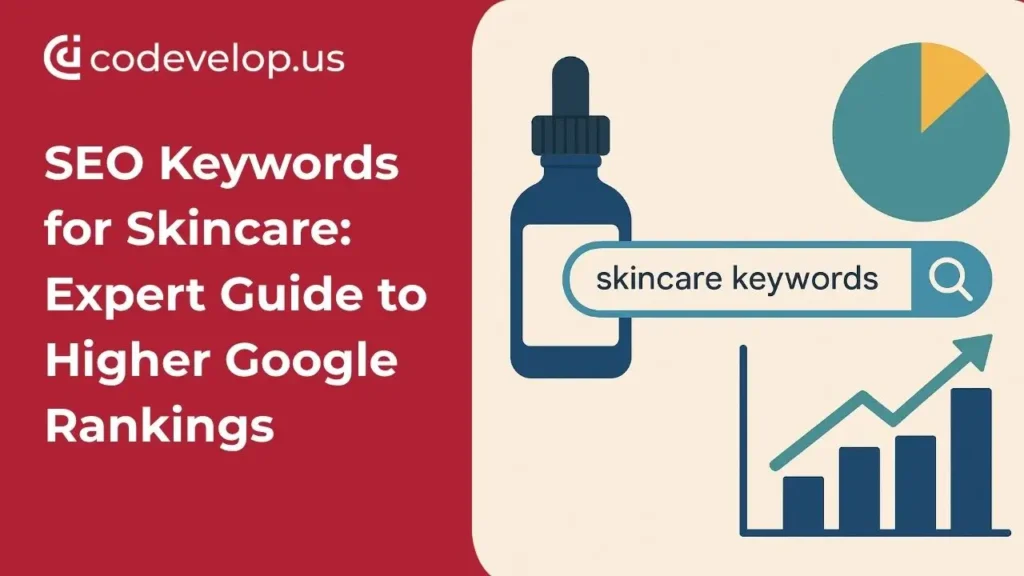SEO keywords for skincare can determine your success in a market where “skin care” pulls in 1,500,000 searches each month. Your brand’s visibility and sales depend on whether you show up on Google’s first or second page in today’s digital world.
Smart keyword selection needs more than just popular search terms. Product-specific keywords like “moisturizers” (823,000 searches) and “serums” (673,000 searches) offer great opportunities to boost your strategy. Adding specific details to product terms can boost conversion rates by 25%. This makes your skincare SEO strategy vital.
This piece will show you the best SEO keywords for skincare businesses and ways to use them on your website. You’ll learn to optimize both product-specific and skin concern keywords effectively. Skincare brands typically spend between $500 and $30,000 monthly on SEO. Understanding how to get the most from your investment will help you rank higher on Google and stand out in this expanding market.
Understanding Skincare SEO and Its Importance
The skincare industry has become one of the most competitive online markets. Brands of all sizes need a planned digital presence. Your brand can stand out in this crowded space by learning to use SEO keywords for skincare effectively.
What is skincare SEO?
Skincare SEO refers to the process of optimizing a beauty brand’s online presence. This optimization helps brands rank higher in search engine results for terms relevant to skincare products and concerns. This digital marketing approach includes three key components: on-page SEO (optimizing website content), technical SEO (improving website functionality), and off-page SEO (earning backlinks and citations from third-party sites).
A well-executed strategy increases the visibility of skincare web pages in Google. This drives more organic traffic and sales without depending solely on paid advertising. It also helps your brand reach customers who actively search for specific solutions rather than interrupting their browsing experience.
Why SEO matters for skincare brands
Visibility defines success in the competitive skincare market. Most skincare purchases start with a Google search. Shoppers research solutions, reviews, ingredients, and brand comparisons before making decisions. Websites that don’t appear in these searches lose vital selling opportunities.
Search positioning significantly affects traffic—the first organic result in Google receives nearly 19 times more clicks than lower-ranked results. The top position captures almost 40% of all clicks, while second place receives just 18.7%.
SEO makes a steady, long-lasting flow of traffic that keeps working for months or even years. This is different from paid ads, which stop functioning when the money runs out. Smaller skincare brands can stand up against big names in the industry by using well-chosen keywords and excellent content.
How search behavior has evolved in 2025
Digital shopping continues to grow rapidly. While brick-and-mortar sales have declined, e-commerce sales in skincare have risen dramatically. Americans spend over $150 billion annually on beauty and personal care products, and nearly 30% of shoppers start their product search online.
Modern skincare consumers show more sophistication in their search behavior. They look beyond simple product names to specific ingredients, benefits, and solutions for particular skin concerns. Brands must optimize for increasingly specific long-tail keywords that match these detailed search queries.
Top Keyword Categories for Skincare SEO
Keywords research is the foundation of any successful skincare SEO strategy. The right keyword categories help you target potential customers throughout their buying trip.
Product-specific keywords
Skincare brands get a lot of traffic from product-specific keywords. These include basic product terms like “facial moisturizer” or “vitamin C serum” and specific formulation terms such as “oil-free moisturizer” and “fragrance-free cleanser”. “Moisturizer” alone gets 450,000 monthly searches. Products with more specific terms can boost conversion rates by up to 25%.
Skin concern keywords
Your audience’s specific problems are addressed by skin concern keywords. Users actively looking for solutions use high-intent terms like “acne treatment products,” “dark spot correction,” “anti-aging solutions,” and “sensitive skin care”. These keywords bring in qualified traffic because they match people’s actual skin problems.
Ingredient-focused keywords
Skincare consumers pay more attention to ingredients now than ever before. They search for terms like “niacinamide benefits,” “hyaluronic acid products,” “vitamin C skincare,” and “peptides in skincare”. Users who prefer natural formulations look up terms like “tea tree oil skincare” and “natural retinol alternatives”.
Branded vs non-branded keywords
A complete SEO strategy needs both branded and non-branded keywords. Your company name or product names fall under branded keywords, while general industry terms are non-branded keywords. Google Search ad budgets are typically split 18% to branded and 82% to non-branded keywords. Branded keywords perform better with about 1299% ROAS compared to 68% for non-branded terms. Branded keywords help keep customers and drive direct sales, while non-branded keywords excel at finding new audiences and building brand awareness.
Local SEO Strategies for Skincare Businesses
Local SEO is very useful for skincare businesses that have physical locations because it can help them attract more customers from nearby who are searching for their services. It is necessary for your business to have a specific local strategy together with wider SEO actions, particularly if you operate salons, spas, and clinics providing face-to-face treatments.
Using location-based skincare keywords
Your business can show up in searches like “facial treatment near me” or “skincare clinic in [city name]” by using location-specific keywords. You should add geographical terms to your website content, service pages, and contact information. Long-tail location keywords that combine your services with your area work better than generic terms. “Organic skincare products in New York” or “best skincare salon in Los Angeles” face less competition and bring in qualified local customers.
Optimizing your Google Business Profile
Your Google Business Profile (GBP) works like a digital storefront and helps your local search rankings. A complete GBP gives potential clients quick access to your services. Here’s how to make it work better:
- Keep your NAP (Name, Address, Phone number) consistent on all online platforms
- Pick business categories that match your skincare services
- Add high-quality photos of your location, team, and treatments
- Answer customer reviews and questions quickly
A well-optimized GBP brings in organic leads naturally. The numbers speak for themselves – 46% of Google searches look for local businesses, and 50% of these searchers click on Map Pack listings.
Mobile optimization for local search
Over half of local searches, precisely 57%, are conducted via mobile devices like phones and tablets. Therefore, it is crucial that your website performs efficiently on these gadgets. Your site must be capable of automatically adapting to any screen size. To maintain the interest of potential customers, pages should load in less than three seconds. The website must be simple to operate with just one thumb and should have obvious buttons for clicking. Google likes sites that are friendly for mobile use, which assists your skincare business in achieving a better rank when people do local searches.
Implementing and Optimizing Your Keyword Strategy
Your digital presence needs a strategic implementation of valuable skincare keywords. A well-laid-out plan will turn keyword research into real results.
Keyword mapping across your site
Smart keyword organization prevents pages from competing with each other in search rankings. You can map your skincare keywords by:
- Creating clusters of similar keywords
- Giving different pages their own keyword clusters
- Building a hierarchy from broad to specific terms
This approach will give a clear focus to each page and reduce keyword cannibalization.
Creating content around skincare keywords
Search engines ended up prioritizing helpful, engaging material over simple keyword usage. Your content creation should:
- Put value first
- Blend keywords smoothly into titles and meta descriptions
- Show product benefits and features with keywords
- Use descriptive language that connects with skincare customers
Avoiding keyword stuffing
Keyword stuffing can damage your SEO efforts by unnaturally overusing target keywords. A balanced strategy that focuses on fresh content and search intent works better. Users stay engaged longer and feel more satisfied.
Tracking keyword performance
Your rankings and traffic improve with consistent performance monitoring. Google Search Console helps you learn about:
- Total clicks
- Impressions
- Average click-through rate (CTR)
- Average position for various keywords
Regular data analysis lets you adjust strategies based on user behavior and trends.
Conclusion
A strong SEO strategy sets thriving skincare brands apart in today’s digital marketplace. By blending product-based, problem-focused, and location-specific keywords, you can improve visibility, attract loyal customers, and build meaningful connections with local audiences through Google Business Profile optimization and mobile-friendly content.
As the beauty industry continues moving online, SEO delivers long-term value far beyond paid ads. With consistent effort, it drives lasting organic traffic and sustainable growth. Start implementing these skincare SEO strategies today to boost your online presence, attract quality leads, and grow your skincare business in 2025 and beyond.
Your skincare business deserves the spotlight! Partner with Codevelop, an SEO and digital marketing agency in Portland that specializes in helping skincare and beauty brands dominate local and national search results. Book your free consultation today.


